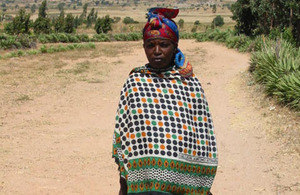Dignity and relief after years of suffering
UKaid helps women suffering from obstetric fistula access surgery in Tanzania

Martina in her village in Singida, Tanzania, where she now leads a normal healthy life. Picture: Women's Dignity
At least 1 woman dies every 90 seconds during pregnancy and childbirth. These deaths are only the tip of the iceberg; for every woman that dies up to 30 more suffer from a debilitating illness or permanent disability.
For 35 years, Martina rarely ventured out of her house in Ntunduu village in Singida, Tanzania. She suffered from obstetric fistula, developed during the birth of her first child. Obstetric fistula is a devastating childbirth injury, caused by prolonged obstructed labour, which leaves women leaking urine uncontrollably. In nearly all cases of obstetric fistula, the baby dies, as did Martina’s.
It was Martina’s husband who encouraged her to talk to volunteers from the Women’s Dignity Project (WDP) when they visited her village. Women’s Dignity works to ensure all Tanzanians - particularly marginalised girls and women - realise their basic right to health. WDP focuses on maternal health and has a particular commitment to ensuring the dignity and rights of girls and women living with obstetric fistula.
“I told them that I had been leaking urine all the time and uncontrollably for 35 years,” says Martina. “They took me to the hospital for treatment. I was reluctant at first, until my husband told me to go with them. I had my bladder repaired and a catheter was inserted. I was in hospital for a few weeks. During that time, Women’s Dignity gave us soap, water and other supplies.
“I was very happy to go back home dry and find my husband waiting for me. He always gave me hope that I would be cured one day, even though my mother-in-law and his brother told him to leave me.”
From 2005 to 2009, with support from UKaid from the Department for International Development, the Women’s Dignity Project has helped a total of 4,915 women by providing them with information on fistula repairs and helping them access healthcare to go on and lead normal healthy lives.
Living with fistula
Martina’s problems began shortly after getting married at the age of 18. ”I was in good health during my pregnancy.” says Martina. ”Labour pains started on a Thursday evening, when I was in the bush fetching firewood. By Friday, the membranes had ruptured and the baby’s head was partially out.
“On the Saturday, my husband decided to take me to Makiungu hospital. We travelled four hours on a bicycle to get to the main road, where we waited for a bus to take us to the hospital. The baby was already dead by the time I arrived, and the doctor had to use forceps to remove the baby.
“After getting the baby out, a catheter was inserted. They removed it the next day and I started leaking urine. I was told to go home.
“I had 11 more children and all survived. People said my condition could not be cured and I thought I would die leaking urine.”
Like Martina, many women and girls live for years with fistula, unaware that surgery is available, or unable to afford treatment. The constant leaking of urine leads to uncontrollable odours and they are often ostracised by their communities and abandoned by their husbands, or become so ashamed that they isolate themselves. Fistula inhibits their ability to work, and if they don’t have the support of their husbands, they can be driven deeper into poverty.
Key Facts:
Women’s Dignity focuses on improving maternal health so women no longer fear death in childbirth, or consequences such as obstetric fistula.
Approximately three million women around the world live with the constant and humiliating smell and wetness of fistula.
Women’s Dignity Project has been running since 2002. DFID support to the organisation started in 2005 and £1,256,000 was approved over the five year period from 2005 - 2010.
DFID Tanzania funded 39% of the Women’s Dignity Project budget from 2008 to 2010 (USD 1,612,730). From 2006 to 2010 the programme has helped 4,915 women access fistula treatment.
Women’s Dignity also work to improve evidence on maternal health, health equity, and fistula to inform government policy and practice as well as encourage citizen’s debate, particularly on girls and women to bring about change in health rights and accountability. They also work to advance a common agenda on health rights, maternal health and fistula through strategic partnerships and Civil Society Organisations.